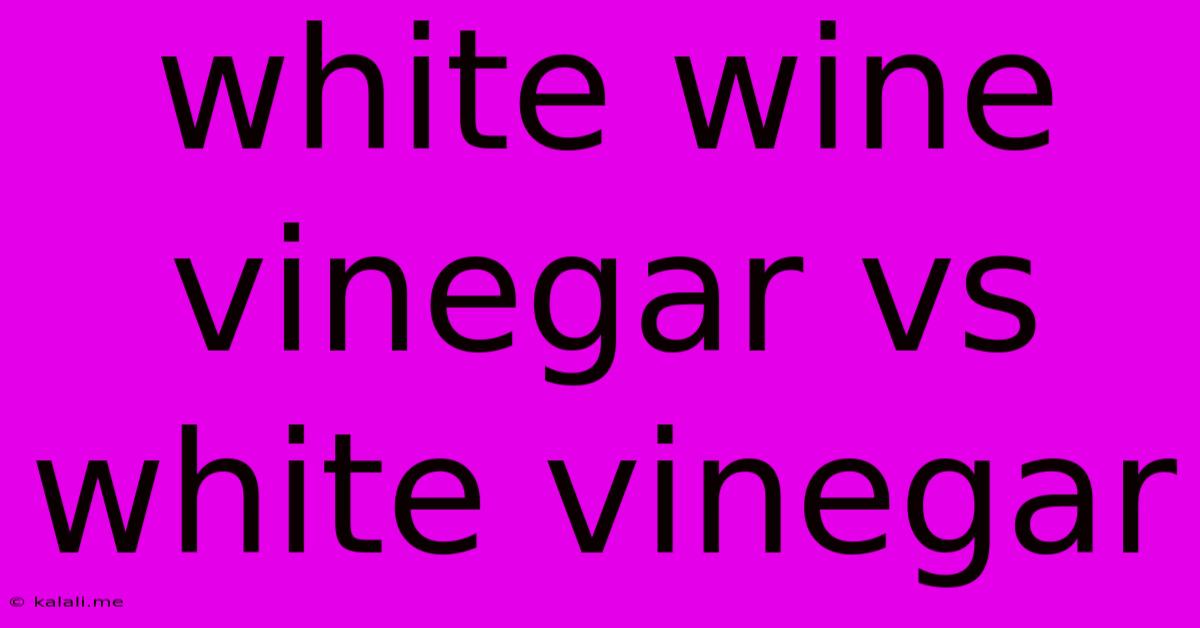White Wine Vinegar Vs White Vinegar
Kalali
May 23, 2025 · 3 min read

Table of Contents
White Wine Vinegar vs. White Vinegar: Unveiling the Differences
Choosing between white wine vinegar and white vinegar might seem trivial, but understanding their subtle differences can significantly impact your cooking and cleaning. This article will delve into the nuances of each, highlighting their distinct characteristics, applications, and overall flavor profiles to help you make the right choice for your needs. Whether you're a seasoned chef or a kitchen novice, this guide will illuminate the distinctions between these two common pantry staples.
What is White Vinegar?
White vinegar, also known as distilled vinegar, is a staple in many households. It’s created through a fermentation process where grain alcohol (often from corn, barley, or potato) is fermented by acetic acid bacteria. This process results in a clear, colorless liquid with a sharp, pungent aroma and a distinctly acidic taste. Its versatility extends beyond cooking; it’s a potent cleaning agent, effective in removing stains and disinfecting surfaces.
What is White Wine Vinegar?
White wine vinegar, on the other hand, originates from the fermentation of white wine. Unlike its distilled counterpart, it retains some of the subtle flavors and characteristics of the original wine. This results in a slightly milder acidity compared to white vinegar, with a more nuanced flavor profile that can range from fruity and subtly sweet to subtly tart and herbaceous, depending on the type of white wine used in its production. This milder acidity makes it a favorite choice for dressings, marinades, and sauces.
Key Differences: A Comparative Table
| Feature | White Vinegar | White Wine Vinegar |
|---|---|---|
| Source | Fermented grain alcohol | Fermented white wine |
| Acidity | Higher | Lower |
| Flavor Profile | Sharp, pungent, acidic | Milder, nuanced, fruity or herbaceous notes |
| Color | Clear, colorless | Clear, light pale yellow (sometimes slightly straw colored) |
| Applications | Cleaning, pickling, general cooking | Salad dressings, marinades, sauces, cooking |
| Price | Generally cheaper | Generally more expensive |
When to Use White Vinegar
Cleaning: White vinegar's high acidity makes it an excellent natural cleaning agent. Use it to:
- Clean windows and mirrors
- Descale appliances (coffee makers, kettles)
- Remove stains from clothing (pre-treating)
- Disinfect surfaces
Cooking: While its sharp flavor might be overpowering in some dishes, white vinegar can be used for pickling, adding brightness to sauces, or as an ingredient in certain recipes where a strong acidic note is desired.
When to Use White Wine Vinegar
Cooking: White wine vinegar's subtler flavor adds a sophisticated touch to many culinary creations. It's ideal for:
- Salad dressings: It creates a brighter, more flavorful dressing compared to white vinegar.
- Marinades: It tenderizes meat and adds depth of flavor.
- Sauces: It balances sweetness and acidity in sauces, preventing them from becoming overly tart.
- Pickling: Although white vinegar is suitable, white wine vinegar often imparts a more nuanced flavor.
Conclusion: Choosing the Right Vinegar
The choice between white vinegar and white wine vinegar hinges on your intended use. White vinegar excels in cleaning and applications requiring a strong acidic punch. White wine vinegar, with its gentler acidity and more complex flavor profile, shines in culinary creations where subtle flavors are appreciated. Understanding these key differences will empower you to select the perfect vinegar for your specific needs, enhancing both your cleaning and cooking experiences.
Latest Posts
Latest Posts
-
Why Two Ts In The Word Letter
May 23, 2025
-
How To Change Only One Specific Color In Preview
May 23, 2025
-
Can A Pentagonn Make Eulers Curcit
May 23, 2025
-
Ls Too Many Files Doesnt Show All Files
May 23, 2025
-
Weight Paint Front Faces Only Not Working
May 23, 2025
Related Post
Thank you for visiting our website which covers about White Wine Vinegar Vs White Vinegar . We hope the information provided has been useful to you. Feel free to contact us if you have any questions or need further assistance. See you next time and don't miss to bookmark.